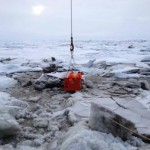These studies were conducted as part of the PROGRESS project which is funded by the Federal Ministry of Education and Research. PROGRESS is the acronym for Potsdamer Forschungs- und Technologieverbund für Naturgefahren, Klimawandel und Nachhaltigkeit (Potsdam Research Cluster for Georisk Analysis, Environmental Change and Sustainability).
In addition to the Alfred Wegener Institute, departments of the Deutsches GeoForschungsZentrum (GFZ German Research Centre for Geosciences), the Potsdam-Institut für Klimafolgenforschung (Potsdam Institute for Climate Impact Research), as well as the Hasso-Plattner-Institut für Softwaresystemtechnik (Hasso Plattner Institute for Software Systems Engineering) are participating in this project.
Details of the Studies:
F. Günther, P. P. Overduin, A. V. Sandakov, G. Grosse and M. N. Grigoriev: “Short- and Long-Term Thermo-Erosion of Ice-Rich Permafrost Coasts in the Laptev Sea Region”, Biogeosciences, 10, 4297–4318, 2013, doi:10.5194/bg-10-4297-2013
URL: http://epic.awi.de/33391/
F. Günther, P. P. Overduin, A. Baranskaya, T. Opel and M. N. Grigoriev: “Observing Muostakh Island Disappear: Erosion of a Ground-Ice-Rich Coast in Response to Summer Warming and Sea Ice Reduction on the East Siberian Shelf”, The Cryosphere Discuss., 7, 4101–4176, 2013, doi:10.5194/tcd-7-4101-2013
URL: http://www.the-cryosphere-discuss.net/7/4101/2013/tcd-7-4101-2013.html
Source: AWI.
The Alfred Wegener Institute conducts research in the Arctic and Antarctic and in the high and mid-latitude oceans. The Institute coordinates German polar research and provides important infrastructure such as the research ice breaker Polarstern and stations in the Arctic and Antarctic to the international scientific world. The Alfred Wegener Institute is one of the 18 research centres of the Helmholtz Association, the largest scientific organisation in Germany.















